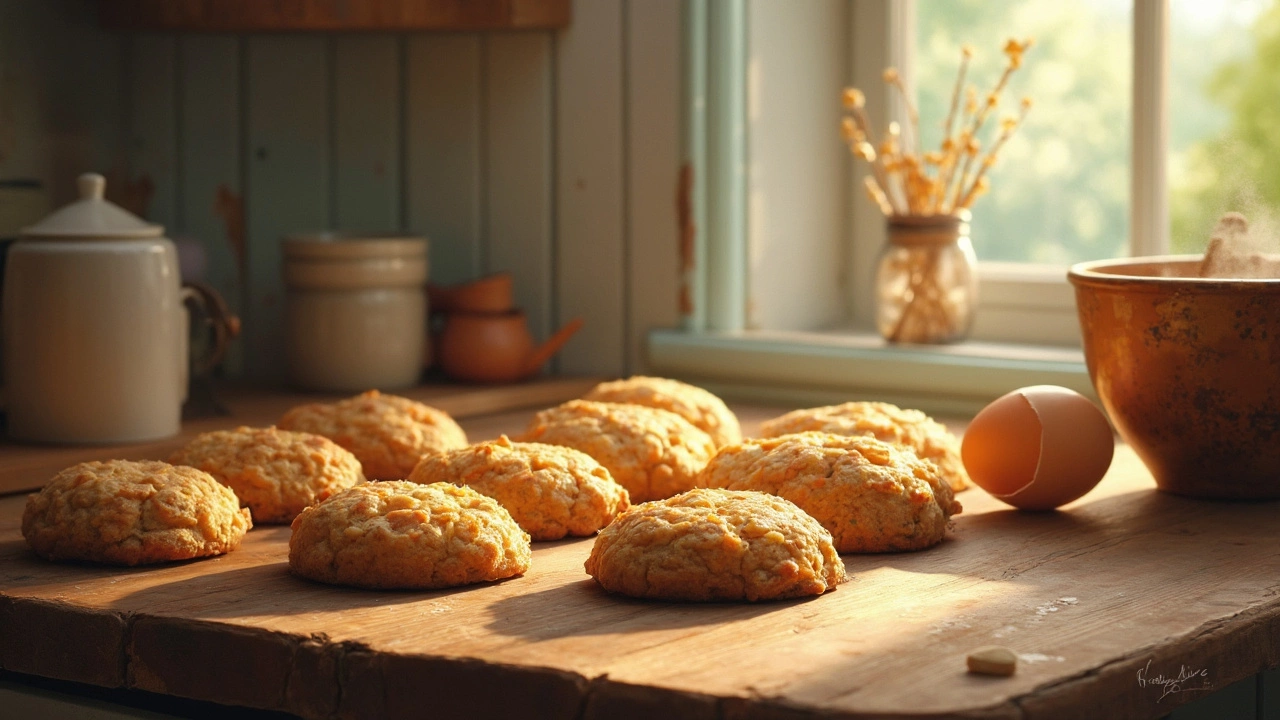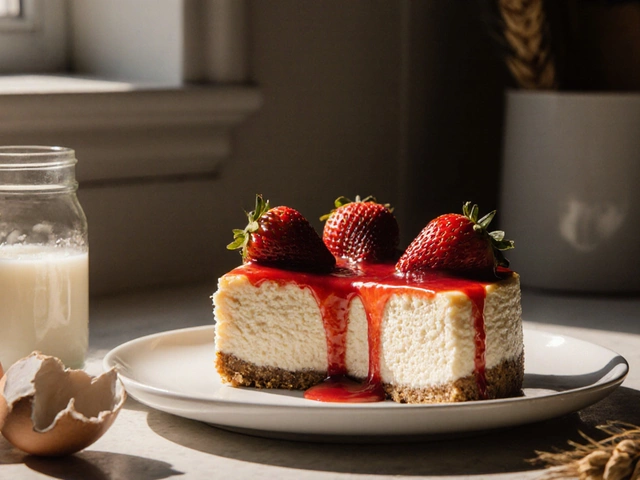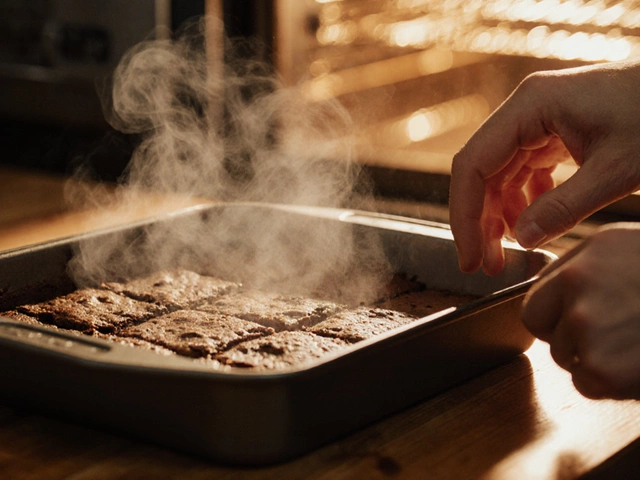Ever cracked an egg into cookie dough and wondered why it’s there? Eggs are a bit like the secret agents of the cookie world. They do a lot of heavy lifting, even if we don’t always notice it. From helping dough rise to making cookies chewy or crispy, eggs bring more to the party than just their shell.
You might think eggs only bind ingredients together. While that’s part of the job, they’re also busy at work with texture and flavor. Depending on how you use them—whole, just the yolk, or just the white—they can change how your cookies taste and feel.
- Eggs: The Unsung Hero in Cookies
- How Eggs Affect Texture
- The Science Behind Egg Yolk and Egg White
- Alternatives to Eggs in Cookies
- Tips for Perfect Egg Usage
- Common Cookie Mistakes with Eggs
Eggs: The Unsung Hero in Cookies
Eggs might not be the first thing you think of when planning your homemade cookie adventure—sugar and chocolate chips often steal the spotlight. But let's give these little guys some credit. They play a crucial role in ensuring your cookies emerge from the oven as the sweet, delightful treats you expect.
First off, eggs are a natural leavening agent. When beaten, they trap air, which helps dough rise as it bakes. This is why your cookies puff up and have a lovely, soft texture instead of turning out flat and dense.
Then there’s the moisture factor. Eggs help retain moisture in cookies. Without them, you'd end up with a dry, crumbly cookie that just isn't as satisfying. The yolk adds richness and flavor, making your cookies irresistibly tender and flavorful.
We also have to talk about emulsification. In simpler terms, eggs help mix fats and liquids evenly, creating a smooth dough where all ingredients work in harmony. This balance is exactly what gives cookies their perfect structure.
And those perfect golden-brown edges? You can thank the proteins in eggs for that. When cookie dough bakes, these proteins solidify, giving structure and that signature look.
Cookie lovers might appreciate knowing that one large egg makes a significant impact. In a classic chocolate chip cookie recipe, the egg isn’t just an ingredient; it’s a game-changer, affecting everything from texture to flavor.
So the next time you reach for an egg while whipping up a batch of cookies, remember you’re adding more than just an ingredient. You're setting the stage for some cookie magic.
How Eggs Affect Texture
Eggs are the texture masters when it comes to cookies. If you want that perfect chewy cookie, it's all about balance, and eggs are the key player. They're packed with proteins that set during baking, which helps hold things together. The trick is in using just the right amount.
What's fascinating is how different parts of the egg can influence texture. The yolk, with its fats, tends to create a richer, more tender cookie. Ever notice how some cookies practically melt in your mouth? That's thanks to the yolk. On the flip side, the egg whites are all about the fluff. They whip up more, introducing air, leading to a lighter and sometimes more crispy finish.
- Chewy cookies: Use the whole egg or add an extra yolk.
- Fluffy cookies: Go easy on the yolks or even try using just the whites.
Funny enough, the size of the egg can make a big difference too. Most recipes call for a large egg, roughly about 50 grams. Using a medium or jumbo? Your cookies might not turn out as expected, whether that's in texture or size.
Sometimes, you might run out of eggs. Don't worry! Some folks say adding a couple tablespoons of applesauce or even mashed bananas isn’t a bad substitute. Sure, the texture might change a bit, but it can add a fun twist to your beloved homemade cookies.
The Science Behind Egg Yolk and Egg White
Ever noticed how some cookie recipes ask for a whole egg, while others call for just the yolk or the white? It's not just for fun—each part of the egg plays a unique role in the chemistry of cookie making. Let's crack this open and see what's going on!
The egg yolk is all about the fat. It’s like the butter of the egg world. When you use yolks, you’re adding richness and tenderness to your homemade cookies. Yolks help make cookies soft and give them a bit of chewiness without being gummy. If you’re going for a rich, almost cake-like cookie, egg yolks are your secret.
Meanwhile, the egg white is the protein powerhouse. Think of it as the muscle builder for your cookie structure. Egg whites help cookies rise and provide strength. If you’re after a lighter, airier cookie that holds its shape well, then egg whites are your go-to. They can make cookies a bit crispier, which is perfect if you love a snap when you take a bite.
A whole egg brings the best of both worlds—some fat from the yolk and protein from the white. It binds ingredients, adds moisture, and helps cookies maintain a balanced texture. Using a whole egg is like getting a one-stop shop for your cookie recipe needs.
When experimenting with your cookie recipes, keep in mind the balance you’re looking for. Want it softer? Add more yolk. Need a bit more structure? Use just the whites. It’s all about knowing what these egg parts bring to the table, and how they can work wonders for your cookies.

Alternatives to Eggs in Cookies
So what if you’re out of eggs or catering to someone with an allergy? Don’t panic! You can still whip up some tasty cookie magic without them. There are plenty of alternatives that can step into the role of eggs when making homemade cookies.
One popular substitute is mashed bananas. They bring moisture and a slight sweetness, making them perfect for a chewy, soft cookie. Use about 1/4 cup of mashed banana to replace one egg. Keep in mind, they might add a bit of banana flavor, which is great if you’re into that.
If you’re aiming for a more neutral taste, applesauce is another option. Similar to bananas, use 1/4 cup of unsweetened applesauce per egg. It keeps cookies moist without overpowering flavors.
For those in need of some lift, baking soda mixed with vinegar can do the trick. Combine one teaspoon of baking soda with one tablespoon of vinegar. This combo won’t add flavor but helps cookies rise.
There’s always the trusty flaxseed meal too. It’s a favorite among vegans. Mix one tablespoon of flaxseed meal with three tablespoons of water and let it sit until it becomes a gel. This not only binds ingredients but adds a slight nutty flavor to cookies.
Here’s a quick overview of these alternatives:
| Alternative | Amount per Egg | Extra Info |
|---|---|---|
| Mashed Banana | 1/4 cup | Slight banana flavor |
| Applesauce | 1/4 cup | Mild taste, keeps cookies moist |
| Baking Soda & Vinegar | 1 tsp & 1 tbsp | Good for rising |
| Flaxseed Meal | 1 tbsp + 3 tbsp water | Slight nutty taste |
The beauty of these alternatives is that they give your cookies a unique spin. Tweak and test to see which one suits your taste buds best!
Tips for Perfect Egg Usage
Alright, let’s crack this open! When it comes to using eggs in cookies, a few handy tricks can seriously amp up your baking game. First off, size matters. Most recipes are calling for large eggs. Using a different size can mess with the texture of your dough, making it too dry or too runny.
Temperature is the next biggie. Cold eggs straight from the fridge can throw the consistency off. Grab them early and let them warm up to room temp. This little change helps mix everything better and leads to a smoother dough.
Want a chewy cookie? Stick with whole eggs. But if you'd like something crispy, swap out one whole egg for two yolks. Yolks add richness without extra moisture, while whites can add a bit of crunch.
Are you short of an egg substitute? No worries! Try a mashed banana or unsweetened applesauce. Typically, one-quarter cup can replace one egg. It won’t be quite the same, but it opens up options, especially if you’ve got allergies or dietary restrictions.
- Always double-check your eggs are fresh. A quick test is to pop them in water—old ones float!
- If you really want to be precise, you can weigh the egg. A large egg usually weighs about 50 grams without the shell.
And remember, baking is as much about experimenting as it is about following rules. So don’t be afraid to mix things up and see what hits the sweet spot for you and your homemade cookies.
Common Cookie Mistakes with Eggs
Even the finest bakers can slip up when it comes to using eggs in their homemade cookies. It’s not just about cracking them open and adding them in—there's a bit of an art to it!
First off, let's talk temperature. Using eggs straight from the fridge is a common mistake. Cold eggs won't mix well and can lead to uneven dough, affecting how your cookies bake. Try setting your eggs out at room temperature before you start. It makes for a smoother mix.
Another pitfall is overbeating them. Whisk your eggs just enough to mix them with the other ingredients. Overbeating can incorporate too much air into the dough, leading to puffier, cakey cookies instead of those chewy, dense morsels we adore.
Ever feel like your cookies are too dry? You might be skipping the step of using different parts of the egg creatively. Remember, egg yolks add richness and moisture, while whites can create more airy, dry cookies. Balance them according to what you like.
If you've ever had a batch with a strong egg taste, you might've used too many eggs. Each egg brings moisture and structure, but too many can overpower your cookie's flavor. Check your recipe, and if you’re adjusting it, start small—like using a yolk instead of a whole egg for a softer cookie.
Lastly, don’t forget about the timing. Eggs should combine well with sugars and fats first, setting a solid foundation before adding dry ingredients. Doing this helps break down the sugars, enhancing the flavor and structure of your cookies.
- Tip: If you ever run out of eggs, fear not! You can use substitutes like applesauce or mashed banana for a moisture boost, though it might slightly alter the taste.





